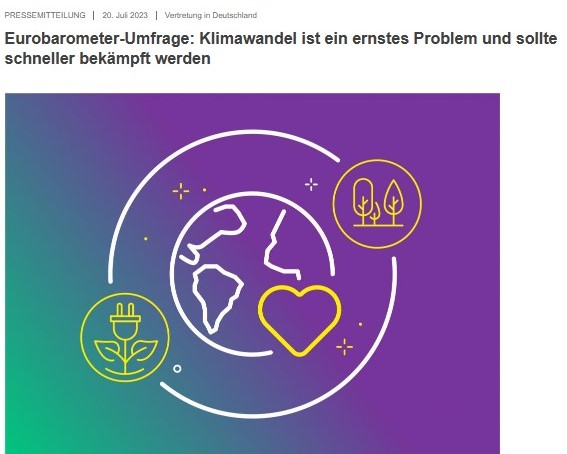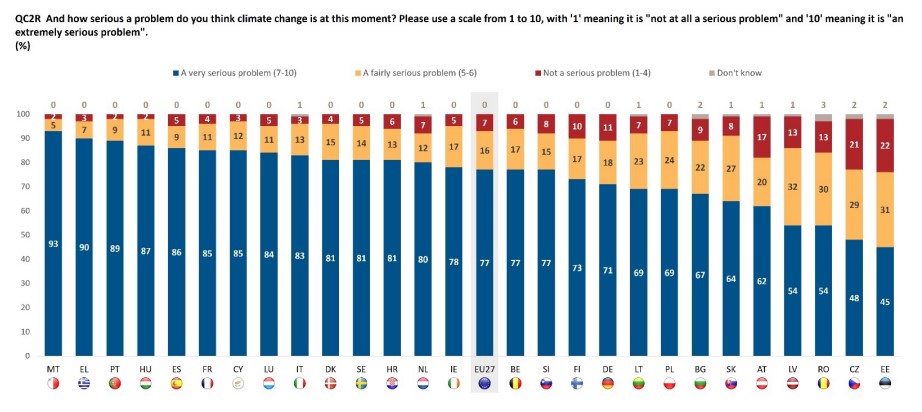On July 20th, 2023, the German representation of the European Commission published a press release entitled: “Eurobarometer survey: climate change is a serious problem and should be tackled more quickly”. The claim that can be derived from this is that the European population perceives climate change as a serious problem. The statistics are correctly reproduced in the press release. However, the claim turns out to be mostly true.

Screenshot taken from the German representation of the European Commission – Headline says „Eurobarometer-survey: Climate change is a serious problem and should be tackled more quickly“.
The fact that climate change is perceived as a serious problem by the European population is a verifiable factual assertion and therefore suitable for the fact check. Climate change is clearly defined as the increasing warming of the earth that has been observed over the last few decades. Whether a person perceives a problem as serious is a subjective statement. However, the claim is exclusively about a representative survey, which makes the statements objective.
The source of the claim is the German representation of the European Commission. As it is an institution of the European Union, the European Commission is considered a government institution and is therefore a trustworthy source. The German representation of the European Commission is also named as the author of the press release. It is therefore the primary source for the claim. In the press release, all claims are supported by the results of a Eurobarometer survey. More precisely, it refers to the report “Special Eurobarometer 538 Climate Change”. The survey was conducted in May/June 2023 and the report was published in July 2023. As the press release refers directly to the survey, the survey results are the primary source’s source material.

Climate change is viewed much more seriously in Western than in Eastern Europe
The survey results are available for download on the EU website and can therefore be viewed by the public. Page 24 of the report contains the results that are of interest for the assessment of the claim. Citizens of all EU countries were asked how serious they perceive the problem of climate change to be on a scale of 1 to 10. All answers between 7 and 10 were interpreted as “a very serious problem”, those between 5 and 6 as “a fairly serious problem”, and all between 1 and 4 as “not a serious problem”. There was also the option to select “I don’t know”.
However, these gradations of responses are very important for the evaluation of the claim. On the face of it, the graph shows exactly what can be read in the press release: that 93% of Europeans stated that they see climate change as a serious problem. However, it should be noted that 77% even said that they perceive climate change as a very serious problem. The press release also takes the German vote into account and also mentions the combined figure of 89% who see climate change as a serious problem. This is made up of 71% who stated “a very serious problem” and 18% who answered “a fairly serious problem”. The non-observance of the gradations in the response options should be regarded as a warning light for the claim. In principle, however, the values from the survey correspond to those given by the primary source. It can therefore be stated up to this point that the rating is either “True” or “Mostly True”.
In addition, the comparative values from the previous survey from 2021 stated in the text of the survey results are also correct. More precisely, this refers to the report “Special Eurobarometer 513 Climate Change”, which was published in July 2021. The survey was conducted in March/April 2021. The data is easy to check, as these results are also publicly available. However, it is noticeable that in 2023, the proportion of responses of “a very serious problem” decreased in 14 out of 27 countries compared to 2021. The four biggest changes in this regard were recorded in Estonia, the Czech Republic, Slovakia and Romania. As a comparison with the 2021 survey shows, fear of climate change has decreased, particularly in Eastern Europe. And the current statistics also show that nine Eastern European countries are below the EU average with regard to the response “a very serious problem”. One consideration here was that the outbreak of war in Ukraine occurred between the two publications. This may have made climate change appear less serious than the war in Eastern Europe. However, this remains a speculation.
Expert: Number of climate change deniers is getting smaller and smaller
In order to have all previous assumptions confirmed by another independent source, the opinion of Dr. Susanne Nawrath was consulted for this fact check. She is the scientific exhibition manager at the Klimahaus in Bremerhaven and an expert on climate change and climate policy. Unfortunately, she does not have an explanation for the apparent East-West divide in the perception of climate change. Nevertheless, she says, awareness of climate change is somewhat lower the further east you look. In Eastern Europe, for example, it is still much more common to generate electricity with coal than it is in the West. When asked whether a figure of 93% of Europeans who see climate change as a serious problem is realistic, the expert replies in the affirmative. “I believe that the group that doesn’t believe in climate change at all is getting smaller and smaller. Nobody is actually trying to do that anymore because the consequences are so clearly noticeable and visible all over the world.” Therefore, she says, it is not surprising that countries in Western and especially Southern Europe, such as Malta, Portugal, Greece, Spain and Italy, are among those most likely to perceive climate change as a problem. After all, these countries and regions in particular have had to contend with major challenges caused by climate change in recent years. In principle, the expert confirms the statements made in the claim.
Conclusion
In a nutshell, the data provided by the primary source is correct. However, the gradation of responses from the survey is not quoted in detail in the press release. Furthermore, the EU average result is not representative of individual countries. This figure therefore quickly obscures the fact that the perception of climate change varies greatly from country to country within the EU. However, these warning lights do not change the fact that the results of the survey are accurate. The claim can therefore be regarded as mostly true.
RESEARCH I ARTICLE © Anton Steinmann & Johannes Vehren, Jade University of Applied Sciences, Germany
Leave your comments, thoughts, and suggestions in the box below. Take note: your response is moderated.




